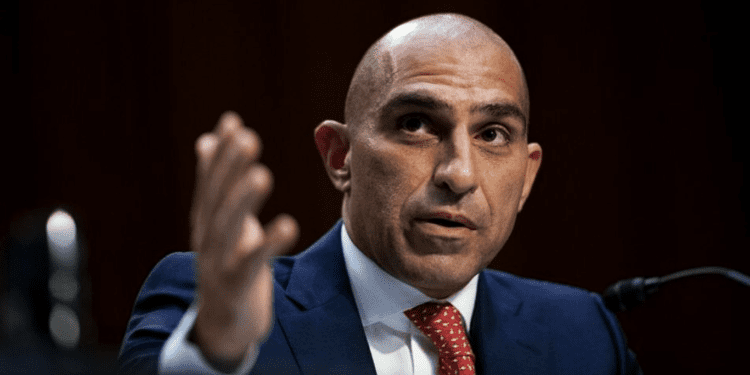- CFTC chairman walked back from his previous statement where he said “Ethereum could be a commodity as well.”
- Confused regulators have made it difficult for crypto to progress rapidly and currently crypto ecosystem is unstable because of that.
- The terms and conditions of regulatory cost different companies billions due to non-serious behavior.
Rostin Behnam, chairman of CFTC, recently stated that only bitcoin (BTC) should be regarded as a commodity for regulatory purposes, not Ethereum (ETH).
Crypto –A Commodity
The idea that ETH and other tokens might eventually run into difficulties because BTC is the only cryptocurrency that can be viewed as a commodity is crucial for the future of the cryptocurrency industry. Additionally, it counters Behnam’s earlier comments, which in October implied that ETH might be a commodity.
Behnam spoke at the event about his experience as a regulator working with bitcoin and acknowledged that “the commodity is challenging to govern under the existing system. According to Behnam, Bitcoin is unlike any other commodity we have dealt with.”
If ETH is classified as a security for regulatory purposes, US regulators might impose stricter regulations on ETH and all other altcoins. Although it is still unknown exactly how such a situation would impact the Ethereum project and the price of ETH, it has long been feared in the Ethereum community.
Blurred Lines Between Regulators
The coordination of the regulatory framework is “imperfect,” the CFTC chair acknowledged in his speech. He remained emphatic, though, that cooperation among the US regulatory authorities is advantageous.
The agencies regulating cryptocurrencies in the US are the Securities and Exchange Commission (SEC), led by famous bitcoin skeptic Gary Gensler, and Behnam’s CFTC. In the past, the CFTC oversaw regulating commodity futures trading, while the SEC oversaw the stock market and other spot markets.
The fact that bitcoin is a commodity that trades in spot and futures markets, both onshore and offshore, has muddled the lines between the various agencies. In a direct request to Congress last year, Behnam requested that his agency’s jurisdiction be extended to include the market for digital assets. He pledged to “protect customers and increase market resiliency” in his request.
The development and broad use of digital assets “offer several fresh regulatory problems across the board. Considering this, the CFTC has actively exercised its existing statutory authorities to prevent fraud and manipulation in these developing markets, according to the agency’s acting head. If affirmed, the CFTC will continue to take a proactive approach to safeguard consumers and boost market resilience.
SEC representative Gary Gensler has also advocated granting the organization more authority to regulate cryptocurrencies. He claims that “because crypto intermediaries combine various activities, there are inherent conflicts of interest and risks for investors. As a result, I’ve asked staff to work with intermediaries to ensure that each of their roles — exchange, broker-dealer, custodial functions, and the like — is registered. Doing so may lead to their roles being divided into different legal entities, which would help reduce conflicts of interest and improve investor protection.”
Prominent Crypto Investors in Attendance
Recent statements from Behnam were made on Wednesday at DeCenter, a brand-new blockchain-focused institute at Princeton University. Several well-known members of the crypto world, including Joseph Lubin, Mike Novogratz, and Dan Morehead, were in the audience.
The event’s keynote speaker, Sam Bankman-Fried, the founder of FTX, did not show up. The topic of “the demise of FTX and other crypto entities” was the topic of a panel discussion instead.
Conclusion
They are not just talking about fiat-pegged stablecoins; the goal is a cryptocurrency entirely defensible and backed by commodities. Additionally, despite Gensler’s invitation for platforms and projects to “come in and talk to us,” other comments claim that businesses have already tried and failed. Since the SEC is still engaged in a protracted legal battle with the company on allegations that Ripple executives “knowingly” sold XRP as an “unregistered security.”














